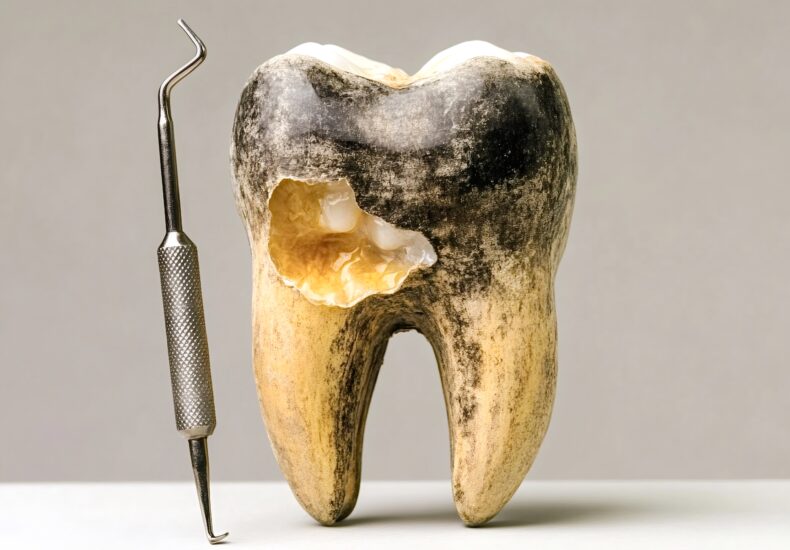
How long until a tooth infection kills you
Tooth infection may appear to be a trivial dental pathology, however, it is a potentially life-threatening disease when not the subject of a treatment. So, can a tooth infection really kills you? Rare, severe infections can spread to vital organs, leading to sepsis and even death. Understanding the risks, symptoms, and treatment options is crucial for preventing such dangerous complications.
Understanding Tooth Infections
An infection of a tooth (dental abscess) is a hole or pocket of pus due to the growth of bacteria in tooth or gum. It usually arises from the legacy of untreated cavities, gingival disease, dental trauma, etc. Unsupervised, the infection can go beyond the mouth, and it can be very dangerous for health.
Types of Tooth Infections
Periapical Abscess Occurs at the tip of the tooth’s root.
Periodontal Abscess Forms in the gums beside a tooth.
Gingival Abscess Affects only the gum tissue and not the tooth itself.
How long until a tooth infection kills you?
Treating a mild infection well depends on initial intervention being made quickly. But, unaddressed, a tooth infection can progress within days or weeks and become life-threatening.
24 to 72 hours: Swelling, pain, and pus buildup begin.
1 to 2 weeks: The infection becomes severe with its spread to mandible, face, or sinus.
2+ weeks: The diagnosis can lead to the bloodstream (sepsis), heart (endocarditis), or brain (brain abscess) and requires an emergency medical treatment.
Factors That Determine the Speed of Infection Spread
Several factors influence how quickly an infection becomes severe:
Immune System Strength: Patients with impaired immunity (e.g., diabetes, chemotherapist patients) are at risk.
Location of Infection: Infections within the proximity of the major vessels/sinuses can more easily disseminate.
Delay in Treatment: The higher the duration of infection, the greater is the risk of complications.
Signs a Tooth Infection is Becoming Life-Threatening
Though it is known that a tooth infection kills you, recognizing symptoms early can possibly save your life. Seek immediate medical attention if you experience:
Severe, persistent toothache
Swelling in the face, jaw, or neck
Fever and chills
Difficulty swallowing or breathing
Rapid heartbeat or dizziness (signs of sepsis)
Mental confusion or extreme fatigue
Potential Life-Threatening Complications
-
Sepsis
Systemic infection involving bloodstream propagation which results in organ failure. Sepsis has a 30-50% mortality rate if untreated.
-
Ludwig’s Angina
A severe neck and jaw infection that may obstruct the airway, leading to asphyxiation.
-
Brain Abscess
In case bacteria reach into the brain a brain abscess will arise which will lead to seizures, coma, and death.
-
Endocarditis
Bacteria from an infected tooth can seed the heart, cause inflammation of its inner lining and block blood flow.
Treatment Options for Tooth Infections
If diagnosed early, a tooth infection can be treated before it becomes dangerous. Common treatments include:
- Antibiotics
Administering to kill bacteria and prevent the infection from spreading.
- Drainage of the Abscess
In a case, the dentist can open the pus to alleviate the pressure and pain.
- Root Canal Treatment
It eliminates the infected pulp of the tooth and hemostasis the tooth in order to stop the reinfection.
- Tooth Extraction
Removal may be required if the tooth is too damaged as to allow infection to continue to spread.
- Hospitalization (Severe Cases)
If infection has travelled outside of the jaw, intravenous antibiotics, surgery, or use of an intensive care unit, may be necessary.
Preventing Tooth Infections
Preventing a dental abscess is easier than treating one. Follow these best practices:
- Brush twice daily with fluoride toothpaste.
- Floss regularly to remove trapped food and bacteria.
- Avoid sugary foods that cause cavities.
- Visit a dentist every six months for checkups and cleanings.
- Address cavities or gum disease promptly before they worsen.
Conclusion
A tooth infection is not something to ignore. While most cases are treatable, delaying care can lead to serious consequences, including sepsis, brain abscess, or even death. When there are signs of infection, please respond by seeking professional assistance as soon as possible. Good oral hygiene practice and regular dental visits can prevent these complications. Teeth are not only for chewing, they are an integral aspect of your health.
FAQs
- Can a tooth infection go away on its own?
No, a tooth infection will not heal without treatment. It will continue to worsen and can spread to other parts of the body.
- Why is dental infection a safety risk?
Unusually, due to the lack of appropriate treatment over a few weeks, a virulent infection can infiltrate the brain in a few weeks and cause life-ending complications such as brain abscess.
Seeking professional treatment is the best option. Antibiotics, drainage and/or root canal can effectively eradicate the infection.
- Can I take antibiotics without seeing a dentist?
No, you need a prescription. Taking anti-bacterial medication without treating the infection could lead to bacterial resistance.
- Can poor dental hygiene cause life-threatening infections?
Yes, neglecting oral health increases the risk of infections that can spread beyond the mouth, leading to sepsis or heart infections.
- Should I go to the ER for a tooth infection?
Yes, if you have a high fever, facial swelling, shortness of breath, or confusion, see the emergency room right away. These are signs of a severe infection.
- Does a tooth infection actually kills?
Yes, if medical treatment isn’t administered, then it’s possible for death to occur quickly – even within a few days.
?
Leave a Reply